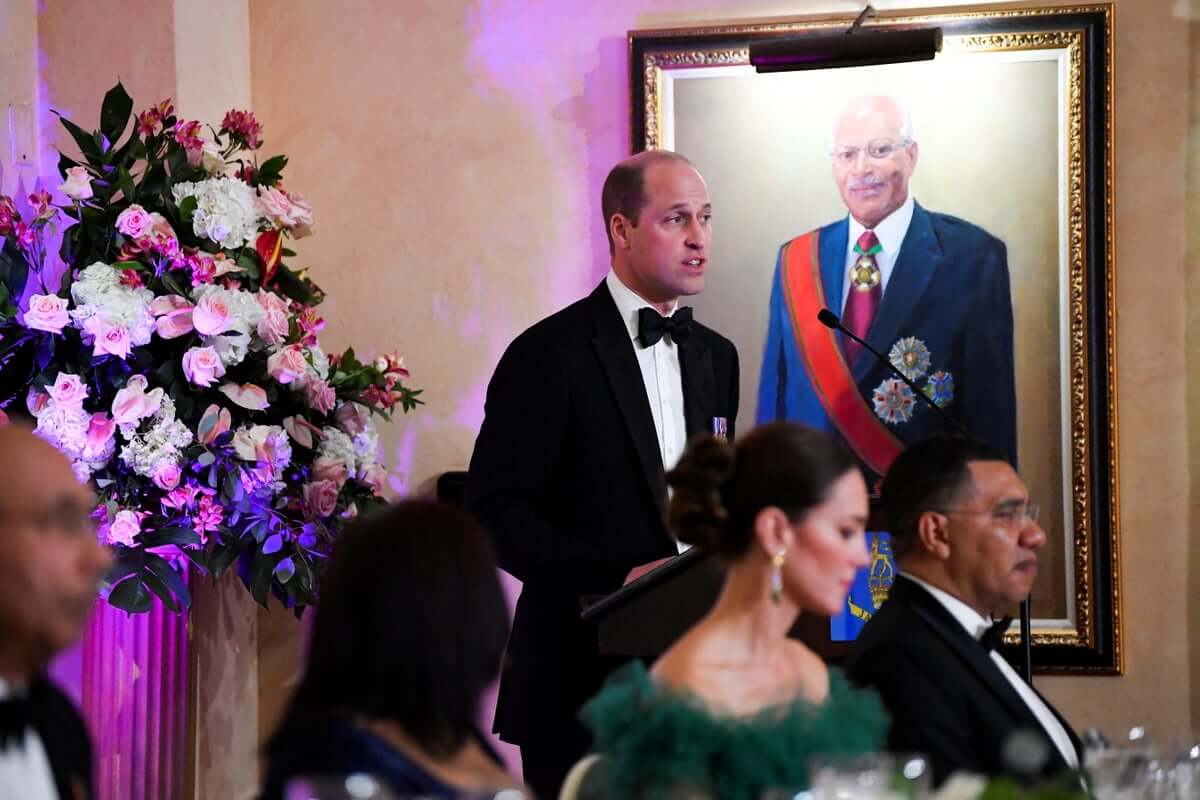While addressing a gathering hosted by Jamaican Governor-General Patrick Allen on Wednesday night, the United Kingdom’s (UK) Prince William called slavery an “abhorrent” practice but failed to apologise for the Royal Family’s role in slave trade.
In his speech, the Duke of Cambridge said, “I strongly agree with my father, the Prince of Wales, who said in Barbados last year that the appalling atrocity of slavery forever stains our history.” Expressing his “profound sorrow,” he said that slavery “should never have happened” and applauded Jamaica for its continued resilience to “forge its future with determination, courage, and fortitude” and its “invincible spirit.”
Read more about the highlights of The Duke and Duchess of Cambridge’s visit to Jamaica 🇯🇲: https://t.co/PZwwFMbCaS
— The Royal Family (@RoyalFamily) March 24, 2022
Next stop, The Bahamas! 🇧🇸 pic.twitter.com/HhQHnU1dC2
The statement came amid rising calls from Jamaicans and Prime Minister (PM) Andrew Holness for independence from the Crown, which they argue “perpetuate[s] colonial subservience.” In fact, William and Duchess Kate Middleton’s visit to the country led to large-scale anti-monarchy protests in capital city Kingston, wherein demonstrators have demanded an apology and reparations from the UK and more specifically the Royal family over their role in slavery. Human rights activists gathered outside the British High Commission and criticised the Duke and Duchess’ visit, calling it an attempt by the Crown to dissuade Jamaicans from seeking freedom.
In celebration of Jamaica’s 60th Independence this year, Jamaicans are demanding reparations and apologies from Britain and the Royal family for the atrocities of slavery and the underdevelopment of the Jamaican people, led by The Advocates Network.#WiNahEaseUp #SehYuhSorry pic.twitter.com/ryFfHaADAx
— Opal Palmer Adisa (@OpalPalmerAdisa) March 21, 2022
Moreover, two days prior to the couple’s visit, a group of 100 Jamaican individuals and institutions published an open letter urging the Duke and Duchess to “begin a process of reparatory justice.” It also demanded an apology for 60 reasons, including the rape and murder of slaves.
The letter added that there was “no reason” to celebrate Queen Elizabeth’s 70 years on the throne, as “her leadership, and that of her predecessors, have perpetuated the greatest human rights tragedy in the history of humankind.” It also accused the Queen of failing to “redress and atone” for the suffering caused by the UK’s “trafficking of Africans, enslavement, indentureship and colonialization.”
Some photos of the protest taking place in Kingston, Jamaica, now ahead of Prince William & Kate's arrival today. The event's been organised by @Advocatesnetja, along with an open letter, calling for apologies & reparations for slavery from the royal family. #RoyalTourCaribbean pic.twitter.com/UQiQiTy9sN
— Nadine White (@Nadine_Writes) March 22, 2022
Furthermore, during the Royal couple’s discussions with Holness on Wednesday, the Jamaican leader informed William and Kate about the country’s intention to “move on” and work towards its “true ambition” of becoming a fully independent republic. “There are issues here which are, as you would know, unresolved. But your presence gives an opportunity for those issues to be placed in context, put front and centre, and to be addressed as best as we can,” he added.
(1/4) I was delighted to welcome the Duke and Duchess of Cambridge, Prince William and Kate Middleton to Jamaica and to the Office of the Prime Minister for a courtesy call this morning. pic.twitter.com/vAq7bznWet
— Andrew Holness (@AndrewHolnessJM) March 23, 2022
After it was seized by the British in 1655, Jamaica remained under colonial rule until its independence in 1962. During this period, tens of thousands of African slaves were trafficked into the country and forced to work under inhumane conditions—a number that then grew to well over 300,000. Post independence, the country took the status of a Commonwealth realm, with the Queen as its ceremonial head of state. The two countries have continued to maintain a strong trade partnership, along with collaborating on issues such as natural disaster management and security.
However, since November, when Barbados attained freedom from the Crown and replaced Queen Elizabeth II as the country’s head of state with its first President, Sandra Mason, countries across the Caribbean have seen a growing discussion about independence from the Crown. In fact, during the Royal couple’s visit to Belize, an event had to be cancelled due to opposition and protests from citizens.
The Duke and Duchess of Cambridge are currently on a seven-day royal tour of the Caribbean islands of Belize, Jamaica, and the Bahamas to celebrate 70 years of Queen Elizabeth II’s accession to the throne. Observers suggest that the visit also aims to persuade the former British colonies to retain the Queen as their head of state and avoid following in the footsteps of Guyana, Trinidad and Tobago, Dominica, and now Barbados.
Mauritius was the last country to remove Queen Elizabeth as its head of state, doing so in 1992. In the Caribbean, Guyana did so in 1970, Trinidad and Tobago in 1976, and Dominica in 1978. She remains the head of state in the Caribbean islands of Antigua and Barbuda, the Bahamas, Belize, Grenada Jamaica, St Lucia, St Kitts and Nevis, and St Vincent and the Grenadines.
To date, a total of 14 countries continue to be a part of the Commonwealth realm, and officially recognise the Queen as the sovereign. While these countries, which include Canada and Australia, are governed by elected representatives, the Crown remains the symbolic head and exercises constitutional duties, such as approving new laws and governments. In these countries, the governor-general acts as the Crown’s representative at state events.
However, these countries are distinct from the 54 Commonwealth nations, including India, which were former British colonies but do not recognise the Queen as their head of state.

